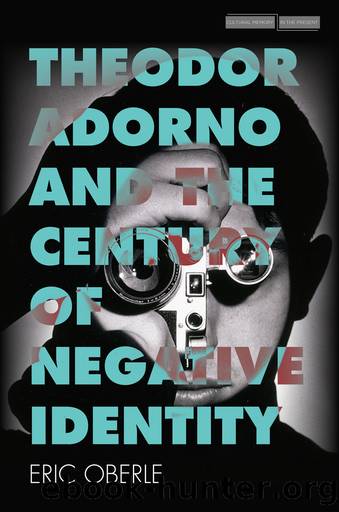Theodor Adorno and the Century of Negative Identity by Oberle Eric

Author:Oberle, Eric [Oberle, Eric]
Language: eng
Format: epub
Publisher: Stanford University Press
Published: 2018-07-14T16:00:00+00:00
5
Negative Modeling
Objectivity, Normativity, and the Refusal of the Universal
Methodological and Hermeneutic Circles
The Authoritarian Personality attempts to study the real power of something unreal: identity and its shadows, race and anti-Semitism. The technical challenge was to create a method for studying these real problems without creating a “methodological circle” that would reproduce in thought the injuries of incomplete emancipation and the woundedness of the universal that the authors sought to study. This chapter examines the conceptual construction of The Authoritarian Personality, considering its method of analyzing data, thinking through narratives, and repurposing definitions. The standard account of Adorno’s career suggests that the time spent on empirical psychological research was time lost for the true work of philosophical speculation; it emphasizes Adorno’s disdain for his American colleagues, as well as his American research subjects, and implies that designing surveys was perhaps not the one-time musical composer’s forte. This chapter seeks to show that the opposite was true: that Horkheimer had made an astute choice when he saw Adorno’s musical analysis of technique and expressivity as the key to understanding how subjectivity is produced and expressed in modern societies, and that the speculative work on the problems of both subjective and objective identity pursued by the pair during the mid-1940s laid the ground for constructing a large-scale multidisciplinary research project that produced valid data because it did not presume what it sought to prove.
The central focus of the work that went into The Authoritarian Personality involved the problem of identity, and a central part of this work involved the researchers’ reevaluation of their willingness to dignify the ideas of identity, race, and projective alterity as worthy of scientific inquiry. This was not a war they had ever wanted to fight. As Kantians and Marxian universalists, they resisted contaminating fundamental definitions of social thought and subjective rationality with a vocabulary tinged by racism or social Darwinism. They had, however, to be pragmatic in the acceptance of Pragmatism. In the previous chapters we have seen Adorno and Horkheimer build alliances with Americans associated with a number of disciplines, a collaboration requiring them to compromise on the objects they were willing to study and on the languages and methods of scientific research they would deploy. To read The Authoritarian Personality is to see how far they went in adopting the American language of race and culture; it is also, however, to witness how successful they were, through a negative deployment of these languages, at adapting the existing tools of American social science toward a critique of the identity concept. This work, performed by émigrés in a quest to understand the forces that had made them émigrés, was applied not just to American society, but to the entire layered, non-identical selves and value spheres implied by sociological, psychological, economic, and political analysis.
If The Authoritarian Personality is a monument to the kind of work Adorno could accomplish by persisting in his refusal to adapt to American standards, the project ultimately demonstrates how much Adorno had been changed and
Download
This site does not store any files on its server. We only index and link to content provided by other sites. Please contact the content providers to delete copyright contents if any and email us, we'll remove relevant links or contents immediately.
The remains of the day by Kazuo Ishiguro(7540)
Tools of Titans by Timothy Ferriss(6934)
The Black Swan by Nassim Nicholas Taleb(6182)
Inner Engineering: A Yogi's Guide to Joy by Sadhguru(5886)
Giovanni's Room by James Baldwin(5870)
The Way of Zen by Alan W. Watts(5787)
The Six Wives Of Henry VIII (WOMEN IN HISTORY) by Fraser Antonia(4784)
The Power of Now: A Guide to Spiritual Enlightenment by Eckhart Tolle(4747)
Astrophysics for People in a Hurry by Neil DeGrasse Tyson(4613)
Asking the Right Questions: A Guide to Critical Thinking by M. Neil Browne & Stuart M. Keeley(4564)
12 Rules for Life by Jordan B. Peterson(3722)
The Ethical Slut by Janet W. Hardy(3494)
Skin in the Game by Nassim Nicholas Taleb(3455)
Housekeeping by Marilynne Robinson(3395)
The Art of Happiness by The Dalai Lama(3376)
Double Down (Diary of a Wimpy Kid Book 11) by Jeff Kinney(3267)
Skin in the Game: Hidden Asymmetries in Daily Life by Nassim Nicholas Taleb(3259)
Walking by Henry David Thoreau(3227)
12 Rules for Life: An Antidote to Chaos by Jordan B. Peterson(3195)
